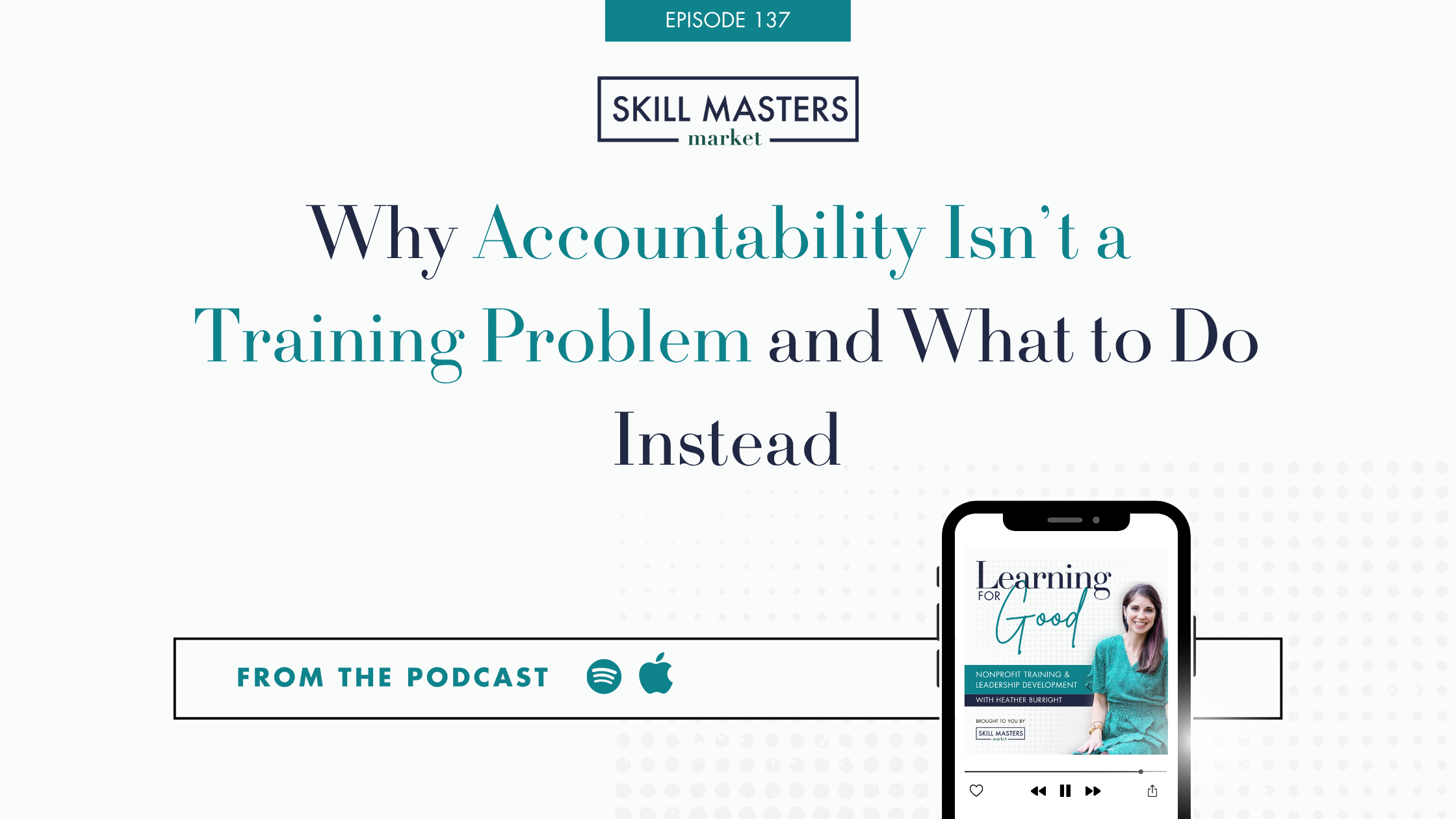Why Staff Accountability Isn’t a Training Problem and What to Do Instead
Improving staff accountability doesn’t always require a training program. In fact, some of the most effective strategies for nonprofit leadership development and team performance don’t involve training at all. In this episode of Learning for Good, I share three powerful non-training solutions to boost accountability, enhance team culture, and drive consistent performance across teams.
Whether you're facing missed deadlines, inconsistent follow-through, or simply want to elevate your team’s effectiveness, this episode offers actionable ideas built on workplace behavior change strategies and rooted in the psychology of habit formation.
▶️ Key Points:
00:58 Why accountability is essential for high-performing nonprofit teams
02:50 Three non-training solutions that can improve staff accountability
05:50 How these non-training solutions support behavior change and habit formation
07:44 Why training alone won’t solve performance challenges
Your team gets along.
They believe in the mission.
And yet… deadlines slip, follow-through is inconsistent, and performance feels uneven.
If that sounds familiar, you’re not alone—and you’re not doing anything wrong. But there’s a leadership gap many nonprofits face, and it’s this:
We’ve created cultures where being “nice” means avoiding accountability.
In episode 137 of Learning for Good, I break down what’s really going on when teams aren’t following through—and why training often isn’t the solution.
Why Accountability Matters
Accountability isn’t about being controlling or punitive.
It’s about building a culture where people:
Know what’s expected of them
Feel ownership of their work
Get timely, honest feedback
Understand the impact of their actions (or inaction)
That doesn’t happen because you run a great training.
It happens because you lead with clarity, consistency, and care.
Why Accountability Training Doesn’t Work
Here’s the mistake I see all the time:
A team isn’t delivering → someone suggests training → a workshop is planned → nothing changes.
Training can build skill, awareness, and even motivation, but it can’t fix:
Unclear expectations
Missing systems
A culture of silence
Leaders who avoid hard conversations
To build real accountability, you need to address the environment people work in—not just their knowledge and skills.
Three Non-Training Solutions to Improve Accountability
If you want better follow-through on your team, try these solutions before you plan your next training:
1. Clarify expectations.
Are your expectations specific and documented?
Have you clearly named what success looks like, who owns it, and when it’s due?
Assumptions kill accountability. Make it impossible for people to misunderstand.
2. Normalize feedback.
Feedback doesn’t need to wait for performance reviews or team meetings.
Start with small moments:
“Can I offer you a thought on that?”
“Here’s what I noticed. How did that land for you?”
Incorporate positive feedback too. Celebrate wins together as a team.
When feedback is frequent and values-aligned, it becomes safe, not scary.
3. Create a culture that emphasizes accountability.
If leaders consistently show up on time, close loops, keep their word, their team will follow suit. If not? They’ll take cues from that, too.
Co-create team norms. Model the behavior you want to see. Give feedback. Create continuous open communication.
Incorporating Behavior Change Techniques
Why do these non-training solutions work?
They actually incorporate behavior change techniques.
If you want people to make a change, they need to have a prompt to change. They need to be aware of the expectations. So communicating clearly is the prompt.
Your people also have to want to change. Communicating with influence helps connect the behavior to a positive outcome - for the org, for the team, and for them. That's motivating. And celebrating wins and showing gratitude reinforces that desire.
Your people need a new routine to implement the change. Being clear about their role and their responsibilities helps create this new routine. So does creating that culture where the team norm IS to follow through.
People want a reward. They want to feel like what they are doing was worth it. And again, this is where that feedback comes in. You're celebrating those wins as a team. You're celebrating them and their work.
And you're doing it in community. Bringing the whole team alongside is a huge part of this. It creates peer accountability. It creates shared ownership. It creates a support system.
And that's how you can improve accountability and elevate performance.
Creating Accountability as a Leader
If you’re struggling with performance, don’t assume your people need training.
Ask instead:
Have I set them up to succeed?
Have I made expectations clear?
Have I created space for feedback?
Am I modeling the follow-through I expect?
Because training can support a shift.
But leadership creates the conditions where accountability can grow.
To learn more about creating staff accountability, tune into episode 137 of the Learning for Good podcast.
Additional Resources Just for You
Other Helpful Podcast Episodes:
How People Managers Can Improve Employee Performance and Job Satisfaction
Improving Employee Performance: How I Tailor Staff Development Solutions to Your Nonprofit
Subscribe to the Nonprofit L&D Insiders.
Join the Nonprofit L&D Collective.
Support the Learning for Good Podcast
Support the Learning for Good Podcast
We are a top 2.5% globally ranked podcast and on the list of top 100 nonprofit podcasts in 2025.
We are currently accepting sponsors. We’ll work together to create a sponsorship package that works for everyone.
Book a call to discuss your unique needs.
Ask a Question or Suggest a Topic
We love hearing from listeners!
Leave a Review
Reviews teach us what content resonates most and help us reach more people!

